Metal Gear Solid 2: Sons of Liberty Accurately Depicts the Postmodern World - An Analysis
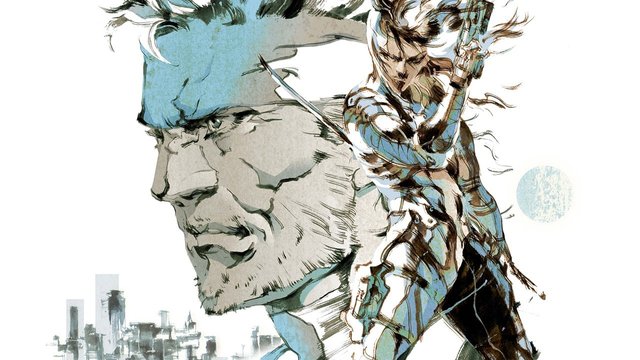
Introduction
The most anticipated product of its time, Metal Gear Solid 2 was released for the PlayStation 2 in 2001. For many people, it was the sole reason to purchase a PlayStation 2. Metal Gear Solid had been a huge success on the previous PlayStation a few years prior, and a highly successful marketing campaign got people excited for the squeal.
I am not a huge fan of Metal Gear Solid 1 and 2 from a gaming perspective; I think the controls are a bit clunky, the camera is wonky and the enemy AI leaves a lot to be desired.
But I am a huge fan of them, especially Metal Gear Solid 2.
Why?
That's what this post is about.
See, Metal Gear Solid 2 is more than just a game. By design, it was more. It was a deliberate depiction of a certain type of world. One that was a dystopia in 2001, but one that can be argued to be reality in 2017. The writer of the series, Hideo Kojima, always had messages in his games, and he always wanted them to be something more and bigger than just a few hours of entertainment on a Saturday afternoon.
This isn't a game review, and this isn't really even aimed at gamer's specifically. I will attempt to analyze this in a way that it is enjoyable for non-gamers specifically.
However, to understand Metal Gear Solid 2, we have to take a look at Metal Gear Solid 1, and how and why it affected the sequel's marketing campaign.
Metal Gear Solid 1 and Metal Gear Solid 2's Marketing Campaign
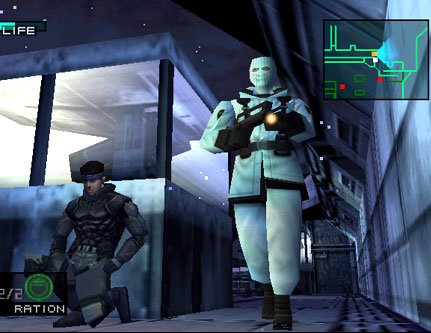
Metal Gear Solid tells the story of a government mercenary retiree called in to do one last job, Solid Snake, clone of a legendary war hero turned villain, Big Boss. Solid Snake, or Snake for short, is everything you want an action hero to be: he's masculine, he's fearless, good with guns, not afraid to kill, and has overly philosophical takes on the idea of being a hero, even questioning his status as one. All the clichés rolled into one. And a very charismatic and entertaining character at that.
Snake was a hugely popular character. And as is the case with badass hero characters, players loved to live vicariously through the character of Snake. Snake is everything the gaming male demographic wants to be: a suave with nerves of steel and who's good with women and who can fight his way through any situation in front of him.
This is all very deliberate and plays into the sequel.
The plot of Metal Gear Solid takes place in the year 2005 in Alaska's island, codenamed "Shadow Moses", where a group of genetically-enhanced special forces soldiers, called FOXHOUND threat to use a nuclear-capable mecha, Metal Gear REX, against the U.S. government if the government doesn't comply with their demands within 24 hours.
This is what Snake is called out of retirement for to stop.
In the end, Snake faces off with the giant mecha named Metal Gear REX, and emerges victorious. Future generations will consider him a hero for preventing a disaster. More on this later.
I will not go into extreme detail of the plot for Metal Gear Solid, but a relevant mention is that the main antagonist of the game is revealed to be Liquid Snake, the second clone of Big Boss, and Solid and Liquid are considered to be brothers.
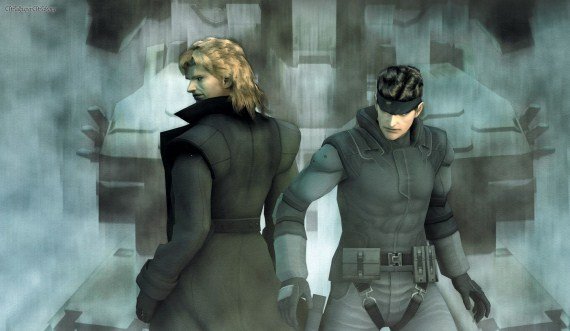
Genes and genetic determination in general are a huge plot vehicle in Metal Gear Solid. It also differentiates it from Metal Gear Solid 2.
The first three of the Metal Gear Solid series can be divided into three separate themes:
- Metal Gear Solid dealt with genes
- Metal Gear Solid 2 dealt with memes
- Metal Gear Solid 3 dealt with scenes
It's the memes part in Metal Gear Solid 2 that I will be looking into when we get to the actual Metal Gear Solid 2. I also find it to be a misunderstood part of today's society.
This is not a post about Metal Gear Solid, but the relevance of Metal Gear Solid becomes clear when we take a look into the Metal Gear Solid 2 marketing campaign.

The hero of the first game, Solid Snake, is on the cover. Snake was also featured in all of the trailers and other promotional material. To fans, there was no doubt that Metal Gear Solid 2 was going to be a game about Solid Snake.
This made people want to purchase MGS2, since everybody loved Solid Snake. Everybody wanted to be Solid Snake. They were anticipating a new Metal Gear Solid game to play another game as Solid Snake, the legendary war hero.
Metal Gear Solid 2 is split into two chapters, the first of which sees Snake infiltrate a tanker that is rumored to house a new form of Metal Gear, Metal Gear RAY. Things quickly go haywire and it's revealed that things are not quite as they seem - like it always happens in Metal Gear games.
The Tanker chapter is everything the people wanted. It was everything that a Metal Gear Solid sequel should be. Snake was cool, the visuals were awesome, the action was great and everybody loved playing as Snake again. To experience the life of a legendary soldier who would stop at nothing.
After the Tanker chapter, however, something drastic happens.
The game jumps forward two years, into a new mission. The player's character, codenamed "Snake", is sent to infiltrate a marine decontamination facility, where the president of the United States is being held hostage.
Very quickly, the player notices something being "off" about the game.
Snake, who is wearing a breathing mask while entering the facility via swimming, doesn't quite seem like himself. Also, the game begins the exact same way that Metal Gear Solid 1 began. It's too coincidental to be anything deliberate. Also, Snake himself is presumed dead after the events of the Tanker chapter. Yet we play as Snake again, by the looks of it, even if he feels weird.
When the mask comes off Snake, however, and he receives a new codename, the gaming community of 2001 lost its collective shit.
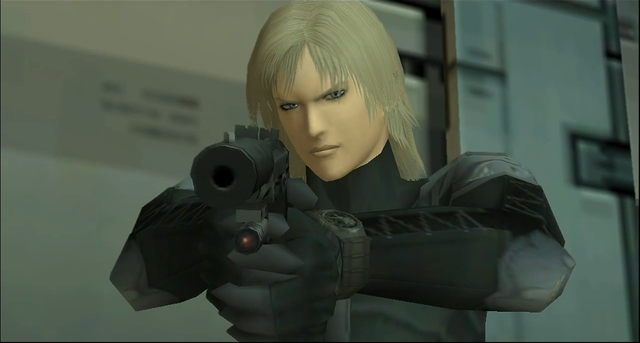
We are introduced to the real main character of Metal Gear Solid 2: Raiden.
The polar opposite of the cool, calm and collected, masculine Solid Snake, Raiden is a pretty boy, in his first mission, who is more timid, way more nervous than the legendary Snake.
This move received a lot of backlash from the gaming community and there are people still mad at this move. Contrary to what people think, however, this is what made it successful. So why was the move made, you may ask.
Raiden
Hideo Kojima knew that players wanted to play as Snake. Snake was someone who made being a killer soldier cool. A lot of players have the hopes of being something like that.
Kojima, however, was not too fond of the idea of a killer like Snake being a hero to many. So, he intentionally screwed with the players' expectations and have them Raiden, while fully knowing that Raiden was not what they wanted.
Moreover, Snake does survive the events of the Tanker chapter and is very much alive, and shows up in the second chapter - but not as a playable character. Instead, he acts as a companion to the player.
This is also very deliberate and extremely meta:
The players hate Raiden, and they want to be Snake. Raiden also looks up to Snake as a hero after the events of the first game. He badly wants to be like Snake, but he simply lacks the experience and knowhow, as well as the confidence.
For all intents and purposes, Raiden is the collective gaming community, all the people who bought MGS2 to play as Snake, to be Snake. Raiden is forced to watch as Snake performs as a badass soldier, disposing of enemy soldiers with ease, just like the player wants to.
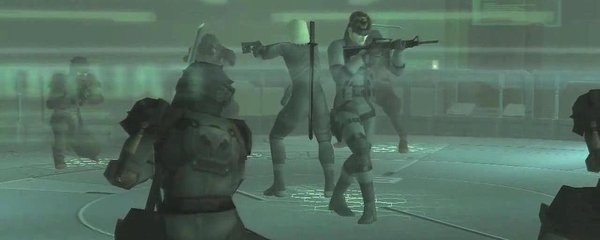
Raiden is the player.
But it doesn't end there.
Earlier, I alluded to the fact that the Raiden chapter of MGS2 begins exactly the same way that MGS1 began. In both games, you enter the area through water, and in both games, your first task is to find an elevator to ground level.
In fact, the entire second chapter of MGS2 is suspiciously like MGS1. At first, you think "Okay, it's a sequel, they're just doing this is some sort of tribute, or something", but the more you play, the more you notice that you're basically playing the first game. There are enough differences to warrant the price of a new game, but you do notice that the events are often carbon copies of the events of first game.
And it's, of course, no coincidence.
It's revealed in the end that the mission that Raiden is on is not a mission at all. In fact, it is a manufactured simulation of the events of the first game. The purpose of the simulation is to produce a Solid Snake like "perfect soldier"; the logic being that the evens that made Solid Snake into a legend would produce a soldier just like him that could be used for whatever purposes the masterminds want the test subjects to be used for. Raiden is the test puppet that the exercise is being tested on.
And so is the player.
The whole meta point of this is to remind the player that it just a game. The player is not a legendary soldier, Solid Snake is. The player does not save the world from a nuclear threat. Solid Snake does. The events are not real, it's all fake.
This plays into an even bigger theme of the game, which is also the main thin I want to discuss, but it's impossible to discuss it without going through the background.
Postmodernism and Constructed Reality

Postmodernism describes both an era and a broad movement that developed in the mid to late 20th century across philosophy, the arts, architecture, and criticism which marked a departure from modernism. While encompassing a broad range of ideas and projects, postmodernism is typically defined by an attitude of skepticism or distrust toward grand narratives, ideologies, and various tenets of Enlightenment rationality, including the existence of objective reality and absolute truth, as well as notions of rationality, human nature, and progress. Instead, it asserts that knowledge and truth are the product of unique systems of social, historical, or political discourse and interpretation, and are therefore contextual and constructed to varying degrees. Accordingly, postmodern thought is broadly characterized by tendencies to epistemological and moral relativism, pluralism, self-referentiality, and irony.
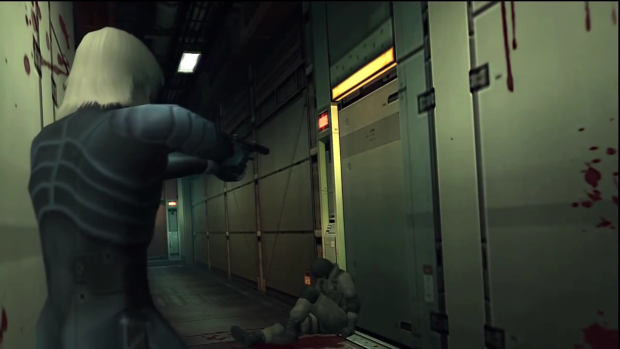
What Metal Gear Solid 2: Sons of Liberty truly is, on top of being a videogame, is a dissection of the nature of a postmodern culture and world.
It challenges the character, as well as the player, to question what is and isn't real; why he believes what he believes. What is the information that he can and can not trust.
In the twist ending, it is revealed that Raiden is being manipulated by a super intelligent AI, disguised itself as the coloner giving him orders through his nano machine radio in his ear.
The AI, or rather a collective of AIs, called The Patriots represent a form of a technocratic committee, superior to the average human, that wishes to guide the human race for its own good. They do not care who they have to harm in order to achieve the what they perceive as the perfect world. Human beings, their information and culture, are to be controlled and censored at the Patriots' whim - and The Patriots have figured out the best way to accomplish this: not by censoring content, but by creating context.
Creating Context
I will quote one of the last conversations of the game. In here "Colonel and "Rose" represent the Patriots AI.
Rose: We started with genetic engineering, and in the end, we succeeded in digitizing life itself.
Colonel: But there are things not covered by genetic information.
Human memories, ideas. Culture. History.
Rose: Genes don't contain any record of human history.
Colonel: Is it something that should not be passed on?
Should that information be left at the mercy of nature?
Rose: We've always kept records of our lives. Through words, pictures, symbols... from tablets to books...
But not all the information was inherited by later generations.
Colonel: A small percentage of the whole was selected and processed, then passed on. Not unlike genes, really.
Rose: That's what history is, Jack.
Colonel: But in the current, digitized world,
trivial information is accumulating every second, preserved in all its triteness.
Never fading, always accessible.
Rose: Rumors about petty issues, misinterpretations, slander...
Colonel: All this junk data preserved in an unfiltered state, growing at an alarming rate.
Rose: It will only slow down social progress, reduce the rate of evolution.
Colonel: Raiden, you seem to think that our plan is one of censorship.
Raiden: Are you telling me it's not!?
Rose: You're being silly! What we propose to do is not to control content, but to create context.
The postmodern world relies heavily on the idea of a lack of an objective reality. This is why people create their own realities, through entertainment, movies, television. Everybody is "entitled" to their own realities, away from the potential harm of a cruel, real world.
People do not live in an objective reality. Instead, they live in their own constructed realities. And when you're the one constructing the realities, you're the one in charge.
This is the message of Metal Gear Solid 2.
The game world of Metal Gear Solid 2 is a carefully constructed fake of the first game. The information that is being fed to Raiden is all fake. Raiden believes it because he trusts the source. And so does the player. The player wants to be the war hero so bad that he's ready to believe anything the game tells him. Despite it being made rather obvious numerous times that something truly is off with the experience, the player refuses to notice this.
The game accurately depicts the age of social media that we currently live in, before there was an age of social media. "All this junk data preserved in an unfiltered state, growing at an alarming rate." The signal to noise ratio is diminishing by the day, with it becoming increasingly difficult to find worthwhile information in the sea of pointless junk.
This, of course, is a result of freedom and people doing what they want - something the game is critical of.
People can draw their own conclusions as to whether the Patriots are the bad guys, or the good guys. On one hand, they are looking to enslave humanity to a soft prison of loose control for their own good, but on the other hand they see humans as a misguided race, on the path to their own, voluntary destruction.
The Patriots think that if there is a force that should control the context of information, it should be them, since they are superior to humans.
Not unlike a politician, really. Which then creates the dilemma of who should have that sort of power. Power like that is scary, and the results are often less than satisfying. So, it really is a catch 22.
Confirmation Bias in the Digital Age of Social Media
Raiden: Create context?
Colonel: The digital society furthers human flaws and selectively rewards
development of convenient half-truths.
Just look at the strange juxtapositions of morality around you.
Rose: Billions spent on new weapons in order to humanely murder other humans.
Colonel: Rights of criminals are given more respect than the privacy of their victims.
Rose: Although there are people suffering in poverty, huge donations are made to protect endangered species.
Everyone grows up being told the same thing.
Colonel: Be nice to other people.
Rose: But beat out the competition!
Colonel: "You're special." "Believe in yourself and you will succeed."
Rose: But it's obvious from the start that only a few can succeed...
Colonel: You exercise your right to "freedom" and this is the result.
All rhetoric to avoid conflict and protect each other from hurt.
The untested truths spun by different interests continue to churn and accumulate
in the sandbox of political correctness and value systems.
Rose: Everyone withdraws into their own small gated community, afraid of a larger forum.
They stay inside their little ponds,
leaking whatever "truth" suits them into the growing cesspool of society at large.
Colonel: The different cardinal truths neither clash nor mesh.
No one is invalidated, but nobody is right.
Rose: Not even natural selection can take place here. The world is being engulfed in "truth."
Confirmation bias is a known phenomenon where we subconsciously favor news stories, articles and general information that supports our preexisting beliefs, in favor of content that challenges them. We all do this, and always have, always will. It can be escaped, at least temporarily, but it takes work, and most people aren't willing to work.
Social media creates the perfect seedbed for confirmation bias, since we are constantly being bombarded with information that supports our chosen ideologies. But it goes deeper than that. It also allows us to escape damn near everything that can be considered unpleasant.
Junk data grows and people share it, further reducing the noise to signal ratio that is already dying off at an alarming rate. People withdraw into their own "information bubbles" where only pleasant content is being shared.
This creates a conflict since the people in the information bubble still need to step out of said bubble to interact with people in the real world. And the truths that are acceptable in any given bubble can, and usually do, differ from each other in radical ways.
This is why we have people with polar opposite views of the world, even though they share the same society.
To others, participating in a Women's March against Trump is an absolute must, while to others it seems pointless and ridiculous.
Also, have you noticed how right wingers feel that the media is being controlled by the left, and left wingers feel that the media is controlled by the right?
This is because we reject information that is in a conflict with our constructed reality, which is constructed piece by piece by the data shared within our bubble.
In Conclusion

Metal Gear Solid 2 can be considered a social experiment, really.
Its purpose is not to be a videogame, purely for the entertainment. Its job is not to give you the opportunity to escape reality and live vicariously through a badass soldier.
From the very beginning of the second chapter, where you play as Raiden, you are being manipulated. You play in an artificial world, in a videogame that is also not real. You are the character of Raiden, who wants to be something that he is not, just like you the player want to be something other than yourself for the duration of the game.
The entertainment media controls more and more of who and what we are as people, and the story of Metal Gear Solid 2 is not so unlike what really happens to us on a daily basis. Why do you believe the things you do? Is the information you rely on real?
Are you happy being yourself, or do you feel the need to escape who you are into the world of mind numbing entertainment, instead of doing something about it?
Also, the whole theme of memes and culture.
As a libertarian, I've noticed that a common concept among libertarians is that if it doesn't interfere with the market functions, it's okay. No matter what it is. No matter what the cultural implications of the outcome are.
See, libertarians don't understand the concept of culture, or memes.
It's possible to change the memes and culture of a society in a way that does not interfere with the market directly, but can alter the society into a less healthy one - and the key is that people voluntarily give in to this, since the very bare, basic concept of freedom is not being infringed. And that's where the thinking stops.
In other words, it's possible to create context, which then allows you to control content. And the control is a form of control that is a lot harder to detect that direct government intervention that is being done through the act of or threat of violence. That sort of control is becoming more and more antiquated since people nowadays have grown skeptical of it, and have better ways of escaping it.
In the game, Raiden is acting on his free will at all times, but all of it is ultimately pointless, since the world in which he acts is one that is being controlled and a fake. Raiden's moves and thoughts are all predetermined, even though he consciously makes them. He is free, but controlled.
His freedom takes place in a very specific context, with only one possible outcome.
That's the trick.
A lot of this stuff just flew over a lot of people's heads when the game first came out. They hated Raiden, they hated that the game was a repetition of the first game, they hated the overly philosophical and drawn out conversation about memes and stuff, especially at the end.
But I loved all of it.
The second they revealed Raiden, who never appeared in any of the promotional material, after the initial shock, I saw where they were going with it. I really liked it. Raiden works as a great avatar for the player, and even though I usually don't like saying stuff like this, I think the hatred for the twist really comes from people just not understanding it well enough. It's an egomaniacal thing to say, but I do believe that people who hated MGS2 didn't think on it hard enough.
Of course, people do play games for different reasons, but I thoroughly enjoyed the meta mindfucks throughout the game.
Even at the very end, The Patriots order Raiden to kill the character Solidus in a final battle to finish the exercise, and Raiden refuses, stating that he is through doing what he is told and from now on he will be a free man, but The Patriots remind him that a child of another character is wired in a way that if Raiden's vital signs disappear, the child dies.
So, Raiden will go through the entire game without making a single decision truly on his own, even after the big reveal that the whole story was a ruse.
Colonel: And this is the way the world ends. Not with a bang, but a whimper.
Rose: We're trying to stop that from happening.
Colonel: It's our responsibility as rulers.
Just as in genetics, unnecessary information and memory must be filtered out
to stimulate the evolution of the species.
Raiden: And you think you're qualified to decide what's necessary and not!?
Colonel: Absolutely. Who else could wade through the sea of garbage you people produce,
retrieve valuable truths and even interpret their meaning for later generations?
Rose: That's what it means to create context.
Raiden: I'll decide for myself what to believe and what to pass on!
Colonel: But is that even your own idea?
Rose: Or something Snake told you?
Raiden: Ahh
Colonel: That's the proof of your incompetence, right there.
You lack the qualifications to exercise free will.
Raiden: That's not true! I have the right --
Rose: Does something like a "self" exist inside of you?
Colonel: That which you call "self" serves as nothing more than a mask to cover your own being.
Rose: In this era of ready-made 'truths',
"self" is just something used to preserve those positive emotions that you occasionally feel...
Colonel: ...Another possibility is that "self" is a concept you conveniently borrowed under the logic
that it would endow you with some sense of strength...
Raiden: That's crap!
Colonel: Is it? Would you prefer that someone else tell you? Alright then. Explain it to him.
Rose: Jack, you're simply the best! And you got there all by yourself!
Raiden: Rrrr...
This is FullHQ!
Extremely good research and good point about libertarianism. ⬆️ 💯
Are you referring to Steemit?! Context can be thought of as a technological framework also 🤔
I was just referring to the age of social media in general, mostly. But of course the same things can apply to Steemit, as well.
Also, on Steemit, the noise to signal ratio currently is a problem. One I'd like to see fixed.
And thanks!
I've been thinking about the signal to noise ratio a lot. I'm working on a bot (of imminent release) and it uses a score based system which basically filters posts based on several criteria to pick which ones to vote on. The vote on list are pretty much always good stuff, I've been working on the algorithm for a while, so it's kind of like a daily round up.
I like this and it's practical for curation rewards and supporting content which is highly likely to actually be good that I can't possibly read all of. But as a filter, as any filter, there's the danger of creating a bubble. I'm wondering am I creating my own kind of echo chamber. I suppose the good thing is that I can tweak the algorithm myself to make sure this doesn't happen too much, but still, the danger is there.
What I'm saying is that there's a kind of interestingness in the noise too that it'd be easy to loose by only looking at "signal". Or perhaps you'd need quite a broad definition of what a "signal" is.
Also I think the Moderation and Community Namespaces feature on this year's roadmap for Steemit will probably improve that a lot anyway, with a different method.
I never played MGS 2. Awesome post - have you played MGS 5? There are some similar themes in that too.
Nope, I don't have any of the current generation of consoles, so I've never played MGSV. I've watched several LPs, though, and other content. Mostly because I was interested in the story. As for that, I was disappointed. It does seem like an extremely fun game to play, though.
MGS1 and MGS2 were not that fun to play, but I dug the stories, whereas MGSV seems like the opposite.
MGS3 is my favorite out of the ones I've played as far as being a game goes; it strikes a fine balance between fun story and good gameplay.
I'm split on the MGSV twist ending; on one hand it was very similar to what was done in MGS2, but I think it was done so well in 2 that there was no need to do it again. Also, Raiden was an actual character, Venom Snake is just an almost mute avatar, and while I understand why, it's not the same.
And we never really got to see the actual Big Boss Turns Evil story we were promised.
Oh, well. The game was released unfinished due to time restrictions, so maybe the finished product would have been better.
It's a shame. I don't like the earlier games but I loved MGS5 - also you can play it on PC. It also has the plot twists and turns with an interesting (if far fetched) story.
I've actually entirely blocked that fact out of my mind. Maybe I will buy the PC version at some point. Not now, but on sale in the future. Thanks for reminding me, hah.
I wouldn't purchase a console for it anyway.
One of the best post I've ever read, Thanks!!
Great analysis of this ahead of its time game that still stands the test of time today. I feel that with every play through of this game I discover something new that still has me scratching my head!